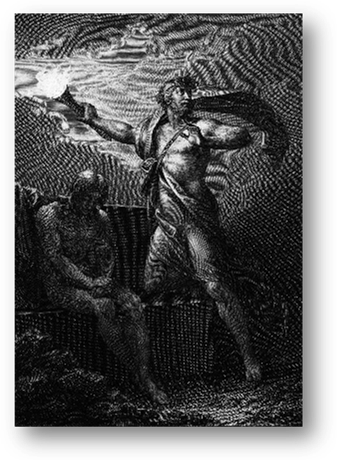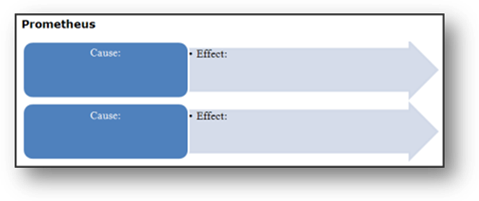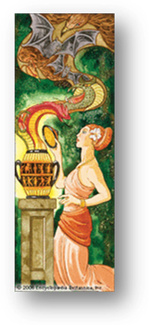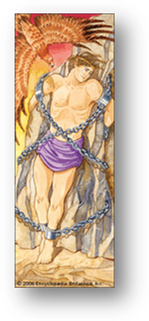PROMETHEUS,
EPIMETHEUS, PANDORA, AND IO

Prometheus Statue in Rockefeller
Center
Unit Overview
In previous units, you read about Zeus and his interaction with others. Remember that Zeus did not like being
tricked. In this unit, you will learn
about Prometheus and his brother Epimetheus, two Titans who were brothers. These two were given the task of creating all
living things. Eventually, Prometheus successfully
tricked Zeus, and received a punishment because of this. It was during his punishment that Prometheus
met Io, another individual who had tricked Zeus. Zeus also decided to punish the humans
Prometheus had created. Their punishment
was called Pandora.
Prometheus & Epimetheus
Prometheus was a Titan who had sided with Zeus in the war with the Titans. The war with the Titans if often called Titanomachy. During this war, Zeus, the Cyclopes, Hecatonchires, Themis, and Prometheus on his side. The Titans were defeated and placed in Tartarus.
Prometheus’ name meant “forethought.” He was very wise; he was wiser than many of the gods. He had a brother named Epimetheus whose name meant “afterthought.” Epimetheus was scatterbrained and acted on impulse. Prometheus and Epimetheus were active in the creation of mankind. They were the sons of Iapetus and Clymene. Iapetus was the son of Uranus and Gaia. Clymene was the daughter of Oceanus and Tethys. Her other sons were Atlas and Menoetius.
Epimetheus was given the task of creating all of the living things that would roam the earth. Epimetheus did not think through the creation of animals and humans. Before making man, he gave all of the best characteristics to animals – he gave them strength, courage, wings, feathers, fur, protective shells, etc. When it came time to create man, there were no “good” characteristics left. There was nothing that Epimetheus could think of that would serve as a protective covering. There were no characteristics that he could give man that would make them be able to stand up to beasts in battle. Epimetheus realized that, once again, he had not thought things through. He turned to his brother for help.
Prometheus then took over the task of creation. He thought of a way to make humans superior to animals. One way that he did this was that he made humans walk upright, like the gods did. He had made them somewhat in the images of the gods. Prometheus gave humans a variety of gifts, including woodworking, brickwork, numbers, the alphabet, carriages, saddles, and art. Prometheus then went up to heaven and to the sun. He lit a torch and returned with fire. This was a protection to men that was far better than fur, feathers, or any type of shell. The gift of fire also helped the humans in ways Prometheus could never imagine. The humans became more productive and inventive. Taking fire from the heavens angered Zeus greatly.

Prometheus Brings
Fire from the Heavens
There were, at this time, no women. Women were created by Zeus because he was angry with Prometheus. Prometheus loved his creation of man. Not only did he steal fire for them, but he also arranged it so that they should get the best part of any animal for consumption. This left the worst pieces for the gods. For example, one time he butchered a great ox. He wrapped up all of the eatable parts in the hide. He then disguised the eatable parts even more by putting the entrails on top. Beside this heap, he laid the bones of the animal. He covered the bones with shining fat and then asked Zeus to choose between the two piles. Zeus selected the pile of bones and fat. When he realized he had been tricked, he was angry. However, he had made his selection and had to stick with it. From that time on, only bones and fat were to be burned to the gods upon their altars. Men kept the good meat for themselves.
Pandora
As we have learned in past units, Zeus did not like being tricked. He swore revenge on Prometheus. His revenge was the creation of a woman. He made her sweet and beautiful. He gave her all of the good qualities that would make her irresistible to man. The other gods were also encouraged to give her gifts or skills. Because she was so beautiful, Zeus named her Pandora. Pandora means “the gift of all.” When Zeus debuted her to man, gods and human men alike found her charming and beautiful. From Pandora came the race of women.
Pandora had one fault, however. This fault was her curiosity. The gods presented her with a box. Into this box, each god put something harmful. They forbid her to open it. Then, the gods sent her to Epimetheus. When Pandora was perfected, she was taken down to earth by Hermes, the messenger god who wore the winged helmet and sandals. Prometheus did not think that Pandora and Epimetheus would make a good couple. He warned his brother to not accept gifts from Zeus. Epimetheus, being impulsive, ignored his brother’s warnings. He was enchanted with Pandora.
Pandora could not contain her curiosity for what was inside the box. One day, she lifted the lid. Instantly, horrible things flew out of the box – plagues, sorrow, misfortune, and mischief. For every good quality that had been given to Pandora, the gods had placed something bad inside the box. Suddenly afraid, Pandora quickly closed the box. It was too late. The happy, carefree lifestyle of man was over. From that point on, man had to deal with unfortunate circumstances.
One good thing had been there, however. That good thing was hope. Hope was the only good thing the box held among the many evil things that were placed in the box. Hope still remains today to be the one defense humans have to comfort themselves against misfortune. This also taught mortals a lesson – never attempt to get the better of Zeus. He will get his revenge.
To learn more about Pandora, watch the video segment below.
|
Pandora’s Box: The Myth (4:06) |
The Revenge of Zeus
Prometheus would soon learn this lesson as well. Zeus punished men by creating women. Zeus forgot that Prometheus had helped him in the battle against the Titans. He had his servants, Force and Violence, capture him and take him to the Caucaus. Here, they bound, or tied, him to a large rock. He was bound in chains that could not be broken.
As Prometheus was bound to the rocks, he spoke to Ocean and the river’s daughters. They were all shocked by Zeus’ actions. Prometheus warned them to not speak ill of Zeus. He assured them that criticizing Zeus would do no good.
This torture wasn’t just punishment for giving men fire, though. Prometheus knew the name of someone who would be very important to Zeus. Prometheus knew that one day, Zeus would have a son who would be so powerful he could overthrow Zeus and drive the other gods from their home at Mt. Olympus. Only Prometheus knew the name of the mother who would have this son.
One day, Zeus sent Hermes, his messenger, to Prometheus. Hermes asked Prometheus the name of the woman who would bear the son who would overthrow Zeus. Prometheus told him that he would not tell the secret. Hermes warned Prometheus that if he did not tell the name of this woman, more torture would come to him. He warned that an eagle would come to him, while he was bound to the rock. Every day, this eagle would eat Prometheus’ liver. Every night, the liver would grow back. Prometheus was to endure this torture for the rest of his life if he did not tell this secret.
No threat or torture could make Prometheus reveal this information. His body was bound, but his spirit was free. He refused to submit to Zeus’ tyranny and cruelty. He knew that he had been a great help to Zeus and that he had also acted correctly by giving fire to the mortals. He felt that he would not give in to any sort of torture. Hermes tried to persuade him to reconsider, but he was not successful. For years, Prometheus endured the torture of the eagle.
Io
In addition to speaking with Ocean while bound to the rocks, Prometheus also spoke with Io. Io was also being punished by Zeus. Zeus had fallen in love with Io. Hera, Zeus’ jealous wife, had discovered this. At one time, Zeus attempted to hide Io in a thick fog. Hera suspected that Zeus had something to do with the fog. When Hera approached Zeus, she saw that he was standing beside a heifer. In order to hide Io, and the truth about his affair, he had turned her into a cow. Zeus swore to his wife that he had never seen the cow before and that it had sprung from the earth. Hera did not believe a word of this lie. She said that it was a beautiful heifer and she begged Zeus to give the cow to her as a present. Zeus could not protest this request. After all, it was just a cow, right? So, Io was now destined to wander the earth in the form of a cow.
Hera made Argus responsible for watching Io the cow. Argus made a good watchman because he had 100 eyes. He could sleep with some eyes open and the others closed, so he would never lose sight of Io. Zeus seemed helpless. He couldn’t come to Io’s aid, because this would expose the affair. Eventually, Zeus decided that he needed to eliminate Argus.
Zeus went to Hermes, his messenger, and told him that he needed to think of a way to kill Argus. Hermes was so clever and Zeus knew that he would be able to come up with a plan. Hermes approached Argus in the form of a man from the country. Hermes was playing on a pipe made of reeds. Argus was pleased at the sound and he invited the musician to come closer. He invited Hermes to sit beside him. Hermes played and played and talked and talked. The plan was to make all of Argus’ eyes fall asleep. Eventually, one story was successful in putting Argus completely to sleep. Once every eye was shut, Hermes killed Argus instantly.
It seemed that Io was free from being watched. Sadly, this was not the case. Hera found out about the death of Argus and assigned a gadfly to watch her. The fly stung Io relentlessly.
Io told Prometheus of the torture of being constantly stung by the fly. Prometheus tried to comfort her, but he was worried that the future he saw for her was not that much better. Immediately before her was a future that included wandering the earth. The part of the sea that she wandered along would be called Ionian after her. Her real consolation was that once she reached the Nile River Zeus would restore her to human form. She would then bear Zeus a son named Epaphus and she would then live a happy life.
One of Io’s descendants would be Hercules, the greatest of heroes. This is the man to whom Prometheus would owe his freedom.
|
|
Now answer questions
1 through 36. |
Cause and Effect
As you can see from this unit, actions have consequences. Each action causes something else to
happen. This is a cause-effect relationship.
Think about each of the gods from this unit. Each of them made choices that caused other
things to happen.
Now you will be completing a cause-effect chart. Download the chart as a PDF document. Here is a portion of the chart.

This document is editable, meaning that you will be clicking and typing information directly on the form. For each god or goddess, you will need to list two cause-effect relationships that you see. For example, Prometheus would not reveal a name to Zeus. That caused him to be bound to a rock as torture. You would type the following onto the chart.
Cause: Prometheus would not
reveal a name to Zeus.
Effect: He was bound to a rock
as torture.
You may use this example as one of the cause-effect relationships on your chart. You will need to complete one more cause-effect relationship for Prometheus. Then continue through the form, adding cause-effect relationships for the other gods and goddesses.
Once you have completed your chart, save it on your computer. You will be asked to submit your completed chart in the questions section of this unit.
|
|
Now answer question
37. |
Writing about
Literature
In this unit, you learned about Prometheus, Epimetheus, Pandora, and Io. These four individuals experienced specific
times in their lives where they had to seriously consider their own
actions.
Use the writing process to write a five paragraph essay comparing and contrasting
the thoughts and actions of Prometheus, Epimetheus, Pandora, and Io. Include information about how their
consideration of their actions affected their lives.
Begin by completing one of the gathering information tasks listed on the table
below. The information gathering task
should generate important details about Prometheus, Epimetheus, Pandora, and
Io.
|
Gathering Information Tasks |
|
|
Brainstorming |
A technique in which you come up with as many ideas as possible
on a subject |
|
Clustering |
A technique in which you break down a subject into smaller
parts – Place the subject in the middle and circle it. Write related ideas around the subject,
circling them and drawing lines to the subject. |
|
Asking Questions |
A technique in which these questions are used to gather
information: Who? What?
When? Where? Why?
How? |
|
Direct Observation |
A technique in which the writer relies on the five senses
– sight, touch, smell, hearing, tasting. |
|
Indirect
Observation |
A technique in which the writer examines the experiences
of others by asking questions, watching, interviewing, etc. |
|
Imaging |
A technique in which the writer uses his imagination to
generate ideas |
Next, using the information
you gathered in the prewriting activity, write an introductory paragraph for
your essay. Remember that a successful
introductory paragraph should state the main idea of the essay. It should capture the reader’s attention.
Once you have your
introductory paragraph completed, write the three body paragraphs of your
essay. These paragraphs should support
the main idea that you stated in your introductory paragraph. The body paragraphs should include
information about the four gods and goddesses.
End your rough draft with a
conclusion paragraph. The conclusion
paragraph should bring your essay to a close.
It should leave the reader with a sense of closure.
After writing the rough draft
of your essay, evaluate your work.
Determine any weaknesses, and then revise your rough draft. Remember that no writing is perfect. There is always room for improvement.
After revising your rough draft, complete one final proofreading of the essay. Then submit the final draft in the questions section of this unit.
|
|
Now answer
questions 38 through 44. |


